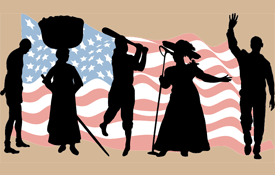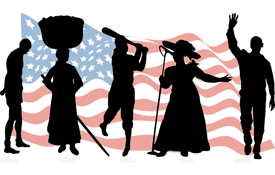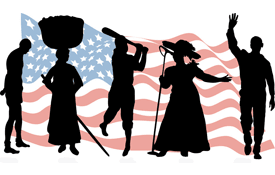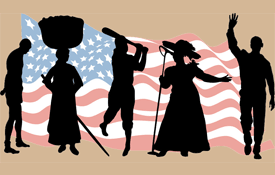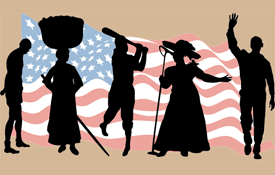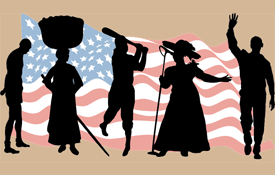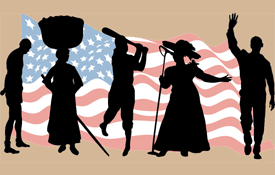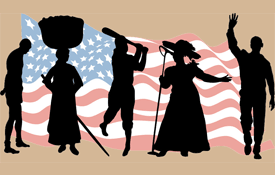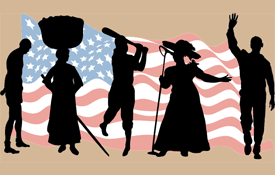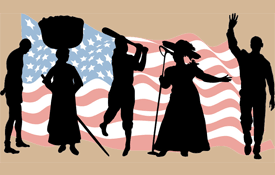Categories
-
0 4 U.S. Postal Service stamps saluting Black History and Jazz
- Music
- by Hugh Smith
- 02/19/2014
These 4 U.S. Postal Service stamps saluting Black History and Jazz are based on the photographs of William P. Gottlieb: Billie Holiday, Jimmy Rushing, Mildred Bailey, and Charlie Parker.
-
0 Jazz legend Dizzy Gillespie checks out fellow legend Ella Fitzgerald in 1947
- Music
- by Hugh Smith
- 02/12/2014
Jazz legend Dizzy Gillespie checks out fellow legend Ella Fitzgerald in 1947.
-
- Music
- by Hugh Smith
- 07/31/2013
Mahalia Jackson pictured here, (1911-1972), was one of the great gospel singers. Thomas A. Dorsey is recognized as "the father of gospel music." Read a snapshot about A History of Gospel Music by Robert Darden and/or listen to Robert talk to Michelle Norris about why this chapter of black history is not well documented.
-
0 Bessie Smith the Empress of the Blues
- Music
- by Hugh Smith
- 12/12/2012
Bessie Smith, (1898-1937), recorded over 80 records for Columbia. Her legendary recordings sold over ten million copies. "Down Hearted Blues," her first recording, sold over one million copies in 1923. She achieved her biggest hit in 1929 with "Nobody Knows You When You’re Down and Out." The influence of blues song stylist Smith can be heard in the music of Janis Joplin, Dinah Washington, Mahalia Jackson, and Billie Holiday. Smith, known as "The Empress of the Blues" was discovered by blues singer Ma Rainey in Chattanooga, Tennessee, in 1910.
-
0 Soul Train Video Classics are back after 40 Years
- Music
- by Hugh Smith
- 08/11/2010
August 2010 Highlight: Soul Train Video Classics are back on Track. It's the 40th anniversary of a biggin' everyone's sure nuff diggin' as Don Cornelius and Time-Life dispatch a new silver streak collection of TV Soul Train video classics. Read Mickie Zoo's nice overview of The Best of Soul Train DVD in honor of Mr. Cornelius' long-lasting television enterprise.
-
0 Let Freedom Sing: Songs from the Movement
- Music
- by Hugh Smith
- 02/24/2010
If you missed the live 2010 White House Celebration of Music from the Civil Rights Movement, here's the next best thing. In January, 2009, Time Life released Let Freedom Sing: The Music of the Civil Rights Movement. The outstanding 3 CD box set includes 2 pages of provocative liner notes written by Public Enemy front man Chuck D. His comments are part of a large, colorful, 40 page booklet that includes lots of facts about all the songs. Chuck says "there's a reason why listening to the past 100 years of black music can bring a sense of voice, sound, meaning, joy, and pain...as well as a historical timeline." He adds "way before an iPod, these songs rang in my head as they navigated me through my near half a century of life." What's great about this collection is the representation of each of the post 1930 - 20th century decades. Historical facts acknowledging key years pertaining to the civil rights movement are also included in their own highlighted paragraphs weaved between the elaborate music notes. The Southern Sons kick things off on disc one with "Go Down Moses," recorded in 1941. Six of the tracks are from the 1930's and 1940's. Four are from the 1950's, including Nat King Cole's stirring 1956 classic "We Are Americans Too." As you'll see from the track list below, no decade is left out. The best songs from the civil rights movement are included. There are some excellent alternative versions rather than hits you might expect. Otis Redding, not Sam Cooke sings "A Change is Gonna Come." Bob & Marcia, not Nina Simone sings "Young, Gifted, and Black." The liner notes have all the back-stories about why these versions were selected. Watch our 90 second video to hear clips of 3 of the songs. Let Freedom Sing: The Music of the Civil Rights Movement: Disc One "Go Down Moses" - The Southern Sons, 1941 "Strange Fruit" - Billie Holiday, 1939 "Uncle Sam Says" - Josh White, 1941 " No Restricted Signs" - The Golden Gate Quartet, 1947 "Black, Brown, and White" - Brownie McGhee, 1947 "The Hammer Song (If I Had a Hammer)" - The Weavers, 1949 "The Death of Emmett Till" parts 1 & 2 - The Ramparts, 1955, "When Do I Get To Be Called A Man" - Big Bill Broonzy, 1955 "The Alabama Bus" - Brother Will Hairston, 1956 "We Are Americans Too" - Nat King Cole, 1956 "Why Am I Treated So Bad" - The Staple Singers, 1966 "I Shall Not Be Moved" - The Harmonizing Four, 1959 "Oh Freedom" - Harry Belafonte, 1959 "Ride On, Red, Ride On" - Louisiana Red, 1962 "Mississippi Goddam" - Nina Simone, 1964 " Blowin' In The Wind" - Bob Dylan, 1962 "We Shall Overcome" - Mahalia Jackson, 1963 "Too Many Martyrs" - Phil Ochs, 1964 "Alabama Blues" - J. B. Lenoir, 1965 "Our Freedom Song" - The Jubilee Hummingbirds, 1965 "A Change Is Gonna Come" - Otis Redding, 1965 Disc Two "Forty Acres and A Mule" - Oscar Brown Jr., 1965 "People Get Ready" - The Impressions, 1965 "Nobody Can Turn Me Around" - The Mighty Clouds of Joy, 1966 "I Wish I Knew (How It Would Feel To Be Free)" - Solomon Burke, 1968 "Respect" - Aretha Franklin, 1967 "The Motor City is Burning" - John Lee Hooker, 1967 "Cryin In The Streets" part 1 - George Perkins & The Silver Stars, 1968 "Abraham, Martin, and John" - Smokey Robinson & The Miracles, 1969 "The Prayer" Ray Scott, 1970 "Say It Loud - I'm Black and I'm Proud" part 1 - James Brown, 1968 "And Black is Beautiful" - Nickie Lee, 1968 "Sock It To 'Em Soul Brother" - Bill Moss, 1969 "Why I Sing The Blues" part 1 - B.B. King, 1969 "I Don't Want Nobody To Give Me Nothin (Open Up The Door, I'll Get It Myself)" part 1 - James Brown, 1969 "Stand!" - Sly & The Family Stone, 1969 "Message From A Black Man" - The Temptations, 1969 "Is It Because I'm Black" - Sly Johnson, 1969 "I Was Born Blue" - Swamp Dogg, 1970 "Yes, We Can" part 1 - Lee Dorsey, 1970 "We the People Who Are Darker Than Blue" - Curtis Mayfield, 1970 "Young, Gifted, and Black" - Bob & Marcia, 1970 Disc Three "The Revolution Will Not Be Televised" - Gil Scott-Heron, 1971 "(For God's Sake) Give More Power To The People" - The Chi-Lites, 1971 "Smiling Faces Sometimes" - Undisputed Truth, 1971 "Inner City Blues (Make Me Wanna Holler)" - Marvin Gaye, 1971 "Hercules" - Aaron Neville, 1973 "Get Up, Stand Up" - Bob Marley and The Wailers, 1973 "Fight The Power" part 1 - Isley Brothers, 1975 "Give The People What They Want" - O'Jays, 1975 "Black Is Black" - Jungle Brothers, 1988 "Sister Rosa" - The Neville Brothers, 1989 "The Pride" - Chuck D., 1996 "Unity" - Sounds of Blackness, 2005 "None of Us Are Free" - Solomon Burke, 2002 "Eyes On The Prize" - The Sojourners, 2007 "Down In Mississippi" - Mavis Staples, 2007 "Free At Last" - The Blind Boys of Alabama, 2008 As you can see, this 3-disc box set is excellent. Don't know some of the artists? Discover the songs by checking out Let Freedom Sing: The Music of the Civil Rights Movement.
-
0 The White House to Host A Civil Rights Music Review
- Music
- by Hugh Smith
- 01/27/2010
First Lady Michelle and President Barack Obama will host another "In Performance at the White House: A Celebration of Music from the Civil Rights Movement." You'll be able to see the show on TV across the USA. WETA television Washington, DC is producing it for PBS. It's scheduled for broadcast on Thursday, February 11, 2010, at 8 pm Eastern. NPR will also air a one hour concert special of the event (for radio) during February, Black History Month. Here's an early list of performers: Natalie Cole Bob Dylan Jennifer Hudson John Legend John Mellencamp Smokey Robinson Seal Blind Boys of Alabama Howard University Choir Morgan Freeman and Queen Latifah will be the happy couple hosting the show. Since the theme of the event is music that inspired the Civil Rights Movement, you'll hear plenty of songs of inspiration. I especially like the collaboration with The Grammy Museum. They'll be offering a downloadable "Music that Inspired the Movement" curriculum for middle and high school teachers, available at GrammyMuseum.org. "A Celebration of Music from the Civil Rights Movement" is the third "In Performance at the White House" program President Obama has offered.
-
- Music
- by Hugh Smith
- 07/03/2009
The story of Michael Jackson, (1958 - 2009), is not complete without the story of the Jackson 5. Michael was born in Gary, Indiana on August 29, 1958. He is one of nine children. When Michael performed with four of his brothers in 1963, at age 5, he was included in the act primarily for the novelty effect. By 1964, The Jackson 5 were conquering the Gary Indiana talent show circuit. In 1967, the brothers appeared at the Apollo Theater in New York City. The same year, they auditioned for Motown Records. "I Want You Back," their first single with Motown in 1969, became a number one hit. On the strength of this song, and the album "Diana Ross Presents the Jackson Five," the group received national television exposure on the Ed Sullivan Show. 1970 saw four number one singles for the Jackson 5. The producers at Motown realized that Michael’s individual talent was worth putting in the spotlight. Between late 1971 through 1972, singles "Got to Be There," "Rockin’ Robin," "I Wanna be Where You Are," and "Ben" firmly established Jackson as a solo star. The string of hits on Motown ended for the Jackson 5 in 1975. Michael, Jackie, Tito, Marlon, and Randy signed with the Epic label in 1976. Jermaine Jackson remained with Motown. Berry Gordy retained the rights to the name The Jackson 5, so the brothers assumed their new professional name, The Jacksons. By 1978, Michael was truly coming into his own as a songwriter, actor, and singer. He starred with Diana Ross in the motion picture musical, "The Wiz." "The Wiz" was scored by Quincy Jones, who would later produce Michael’s most successful commercial work. 1979’s "Off the Wall" album launched Michael Jackson toward super stardom. The album sold over 8 million copies. "Don‘t Stop til You Get Enough" from Off the Wall won Michael his first Best R&B Vocal Performance Grammy. Michael’s electrifying 1983 performance of "Billie Jean" on the television special "Motown 25: Yesterday, Today, and Forever" solidified his place as a pop icon and superstar. By 1984, the "Thriller" album, (released in 1982), won 8 Grammy Awards. Jackson has worked with the biggest names in rock, included 1982 & 1983 duet collaborations with Paul McCartney, ("The Girl is Mine," "Say, Say, Say"), and "State of Shock," recorded with Mick Jagger in 1984. Michael teamed up with Lionel Richie in 1985 to co-author, "We Are The World," a song written to help world hunger. By 1986, Jackson was working with film giants Francis Ford Coppola and George Lucas on his short film project, "Captain EO" for Disneyland and Disneyworld. 1987 saw the release of "Bad," an album that produced four number one singles. Doubleday published Michael’s autobiography, "Moonwalk," in 1988. The "Dangerous" album was released in 1991. In 1993, Jackson entertained during the Super Bowl, appeared on the Oprah Winfrey Show, and received a Living Legend Grammy Award. Like many celebrities, his private life has not been without controversy. Despite being the focus of tabloid journalism, Jackson has attained a place in musical history that few entertainers have achieved. * Biography courtesy of Empower Encyclopedia *
-
0 Odetta Sang for Civil Rights
- Music
- by Hugh Smith
- 12/03/2008
Singer Odetta Felious Gordon, (1930-2008), trained her voice for opera but decided to sing acoustic songs in the folk tradition. The guitar playing vocalist from Birmingham, Alabama, was one of the first popular African American folk singers in the 1960’s. Odetta used her influence to raise awareness about civil rights issues. She passed away December 2, 2008.
-
0 Martin Luther King Jr. Saluted with Song
- Music
- by Hugh Smith
- 04/02/2008
Friday, April 4, 2008 marks the 40th anniversary of the assassination of Dr. Martin Luther King Jr. Here are 2 video tributes we created using a couple of albums, now out of print, that salute the Martin Luther King Jr. legacy. In 1973, a 2nd annual Benefit Concert for the Martin Luther King Jr. Center for Social Change was held at the Omni arena in Atlanta, Georgia. RCA Records was a big sponsor of the event. Many of their artists performed. Here's the rundown of the original double album. Keep The Dream Alive Side 1 Introduction: Mrs. Coretta Scott King "Precious Lord" - Linda Hopkins "It's My Belief" - Linda Hopkins "No One's Gonna Be a Fool Forever" - Friends of Distinction Medley: "Love Or Let Me Be Lonely," "Going In Circles," "Time Waits for No One," "Grazing In The Grass" - Friends of Distinction Side 2 "Hey Leroy" - The Jimmy Castor Bunch "The First Time Ever I Saw Your Face" - The Jimmy Castor Bunch "Betcha By Golly Wow" - The Jimmy Castor Bunch "Troglodyte (Cave Man)" - The Jimmy Castor Bunch Geraldine struts her stuff (Flip Wilson) Side 3 "Make It With You" - Main Ingredient "Work To Do" - Main Ingredient Medley: "You've Been My Inspiration," "Spinning Around (I Must Be Falling In Love)," "I'm So Proud," "Everybody Plays the Fool" - Main Ingredient Comments: Mrs. Coretta Scott King Side 4 "Ain't No Sunshine" - Jose Feliciano "We've Only Just Begun" - Jose Feliciano "Oye Como Va" - Jose Feliciano Comments: Flip Wilson Funny Talk: Flip Wilson "Don't Knock My Love" pts. 1 & 2 - Wilson Pickett "Don't Let The Green Grass Fool You" - Wilson Pickett Keep the Dream Alive was a great concert featuring strong performances. The Atlanta community supported the effort with a large turnout. Martin Luther King Jr. Remembered - Selma the Musical - 1976. Read the notes from playwright Tommy Butler about the Martin Luther King Jr. Selma Musical.
